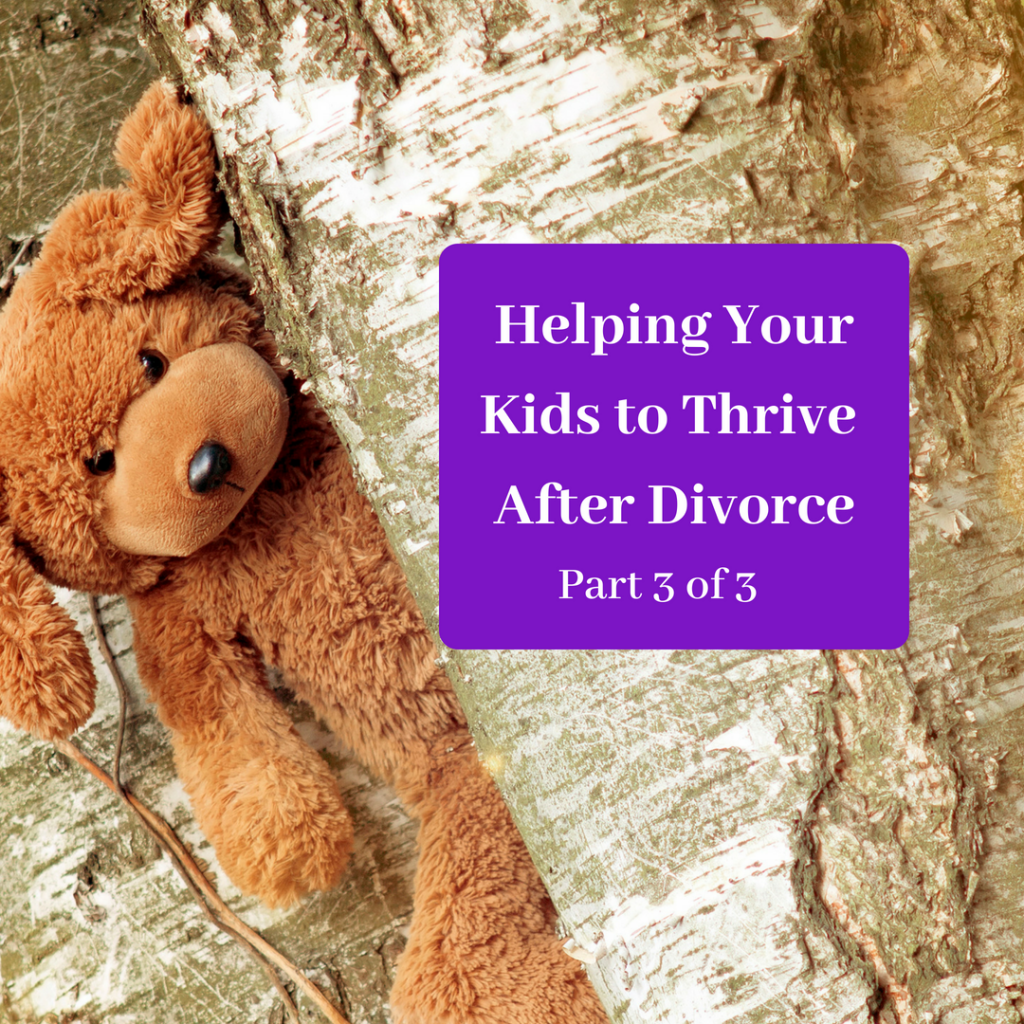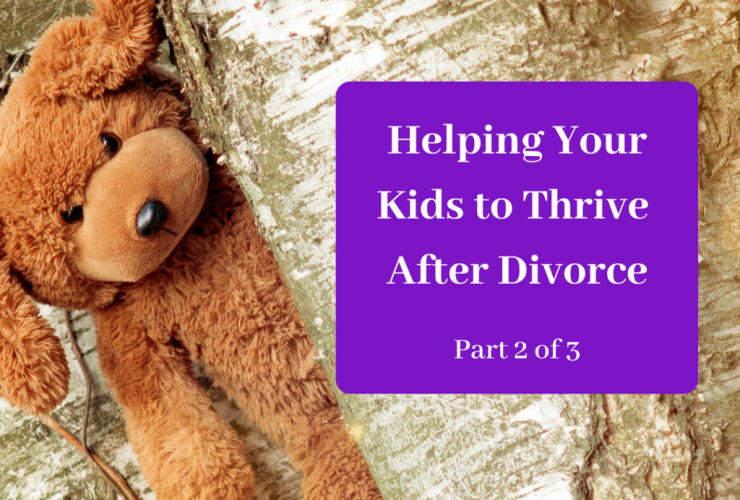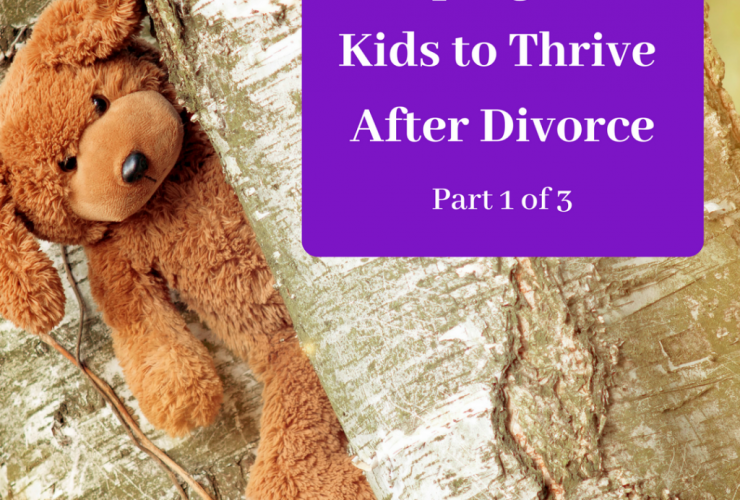
Don’t Practice Poison Parenting
Breaking up is hard to do and it may be especially hard on the kids if they feel torn between warring parents. While I like to put the focus on what “to do” rather than what “not to do,” there are some poison practices worth avoiding.
Regardless of your situation with your Ex, keep you kids out of it. Period. It’s unfair and causes undue emotional stress to use your kids to deliver messages or information to your Ex. Even the most seemingly benign logistics such as pick-up times or lunch money can be charged with emotional fallout.
Avoid oversharing with your kids and using them as your confidants. Their own anxiety and concern for you may come across as them being supportive of you and what you’re going through. However, breaking these boundaries does real damage to your kids’ peace of mind. They can’t handle your adult issues and emotions.
Don’t grill your children for details when they come back from being with your Ex. This puts them in the middle, an uncomfortable emotional position. Stick to light, general questions such as “Did you have fun?” and then let it go.
As tempting as it is, DO NOT trash talk your Ex to your kids or within their earshot. Bad-mouthing can include name-calling, telling the “truth” as you perceive it, blaming and criticizing. Your Ex could be the biggest jerk west of the Rockies, but when you say negative things about their other parent you’re putting your kids in an emotionally impossible situation. The unintended consequences include creating long-term psychological scars for your kids and damaging your relationship with them. In fact, it’s likely to make them more sympathetic to your Ex. Adult children of divorce report the devastating impact this nasty, trash-talking habit had on them. It poisons parent-child relationships and it’s not worth it.
If you suspect or know, that your Ex is “throwing you under the bus” when it comes to your kids, take the high road. If they bring it up to you, listen and reassure them. You can say something like, “Your mom/dad is really angry right now and it sounds like she’s/he’s having a hard time getting over it. I trust that she/he will get past it. The most important thing for you to know is that I love you and that she/he loves you—no matter what.” If you’re concerned that it’s causing them stress, give them access to a therapist so they can share feelings in a neutral space.
What if you’ve already made one or more of these mistakes?
Use it as an opportunity to teach your kids how to apologize and make amends. In other words, own up to it with them. Tell them you’re sorry about what you said, or have been saying to them, about their other parent. Tell them it’s not okay and that you made a mistake. Tell them you were angry but now you know there are better, more constructive ways to deal with your anger. This teaches them what it looks like to gracefully take responsibility for your mistakes and to apologize. Then, do better. Show them you are reliable and are putting them first.
In case you missed them, here are links to the first two parts of this series on helping your kids to thrive after your divorce:
Part 1: Give Your Kids Some Power
Part 2: Give Your Kids an Outlet for Their Feelings
Deb Purdy, is a transformation coach, speaker, workshop leader and author of
Something Gained: 7 Shifts to Be Stronger, Smarter and Happier After Divorce.
Visit www.DebPurdy.com for more information.
Join the conversation on social media:
Instagram: @lovedebpurdy
Twitter: @lovedebpurdy
Facebook: debpurdyofficial



Thank God I trusted Doctor Odunga to bring my ex husband back after 4 years of separation. Before I met Doctor Odunga I searched many websites looking for ways to get my ex husband back after leaving me for another woman. I was devastated but Doctor Odunga gave me hope and assurance that he will be brought back to me. After casting the spell, within 24 hours my husband called to tell me that he is coming back home to me and our two kids. The next day he arrived home and I was very happy to meet him again. I am using this means to appreciate Doctor Odunga for what he did for me and also helping serious minded ones who want to get their loved ones back. Contact Doctor Odunga at odungaspelltemple@gmail.com OR Whats-app him at +2348167159012
DR. GREAT IS THE BEST SPELL CASTER ONLINE WHO RESTORED MY BROKEN RELATIONSHIP AND I HIGHLY RECOMMENDS DR. GREAT TO ANYONE IN NEED OF HELP!
My husband left me for another woman 3 months ago and ever since then my life has been filled with pain, sorrow and heart break because he was my first love whom I have spent my entire life with. A friend of mine told me he saw some testimonies of a spell caster called Dr Great that he can bring back lover within some few days, i laugh it out and said i am not interested but because of the love my friend had for me, she consulted the great spell caster on my behalf and to my greatest surprise after 2 days my husband called me for the very first time after three months that he is missing me and that he is so sorry for every thing he made me went through.He came back to me and now we are happy together. I still can’t believe it, because it is highly unbelievable. Thank you Dr.Great for bringing back my lover and also to my lovely friend who interceded on my behalf, for any one who might need the help of this great spell caster here is the email address:
infinitylovespell@yahoo.com or infinitylovespell@gmail.com
you can also call him or add him on Whats-app:+2348118829899
View his blog http://infinitylovespell1.blogspot.com
.,./
I was searching for help online on how to get my ex back whom we got divorced 5 months ago and i came across so many testimonies online on how this wonderful man called Dr Kala help them to get back their loved ones and restore broken marriages and i quickly contact him on the email that was provided on the comment and explain my problem to him and he did a nice job by helping me to get my divorced husband back within 48hrs.. I never believe that such things like this can be possible but now i am a living testimony to it because Dr Kala actually brought my husband back to me, If you are having any relationship problem why not contact Dr Kala for help via email: kalalovespell@gmail.com or WhatsApp him on +2347051705853. Then I promise you that after 48 hours you will have reasons to celebrate like me.
Hello my name is Vivian Marcus from the United State, i’m so exciting writing this article to let people seek for help in any Break up Marriage and Relationship, Dr Kachi brought my Ex Boyfriend back to me, Thank you Sir Kachi for helped so many Relationship situation like mine to be restored, i was in pain until the day my aunt introduce me to Dr Kachi that she got her husband back with powerful love spell with help of Dr Kachi So i sent him an email telling him about my problem how my Boyfriend left me and cheating on me because of her boss lady at work i cry all day and night, but Dr Kachi told me my Boyfriend shall return back to me within 24hrs and to me everything he asked me to do the next day it was all like a dream when he text me and said please forgive me and accept me back exactly what i wanted, i am so happy now as we are back together again. because I never thought my Ex Boyfriend would be back to me so quickly with your spell. You are the best and the world greatest Dr Kachi. if you’re having broke up Ex Lover or your husband left you and moved to another woman, You do want to get Pregnant do not feel sad anymore contact: drkachispellcast@gmail. com his Text Number Call: +1 (209) 893-8075 You can reach him Website: https://drkachispellcaster.wixsite.com/my-site
I just want the whole world to know about this spell caster I met two weeks ago,I cannot say everything he has done for me and my family I was going through online when I meant this wonderful man’s testimony online how he won a lottery through the help of dr Ose I decided to just give it a try and my life is back to me now after i lost my job due to covid he gave me a winning numbers to play lottery and i won 5000usd for my first play since then i have been working with him and he has been giving me numbers to play my lottery i can not write everything he has done for me if you need a lottery spell today contact him on oseremenspelltemple@gmail.com www.facebook.com/Dr-odion-spell-temple-110513923938220
whatsapp +2348136482342
Good work deserves good recommendation, I met a powerful spell caster whom is 100% real and powerful. I was heart broken when my wife left me and moved out of the house. I felt my life was over and my world was crumbling around me. I tried to be strong just for the kids but I could not control the pains that tormented my heart, my heart was filled with sorrow and pains because I was really in love with my wife. I have tried many options but she did not come back, until a friend directed me to Dr Kala a powerful spell caster and i explain my problem to him and he helped me to get my wife back within 24hrs. Me and my wife are living happily together again, This man is powerful and if you have any problem with your marriage and relationship? Just tell him your situation and he will help you. If you are in need of help to get your love back, you can contact Dr Kala on email: kalalovespell@gmail.com or WhatsApp +2347051705853
DR. GREAT IS THE BEST SPELL CASTER ONLINE WHO RESTORED MY BROKEN RELATIONSHIP AND I HIGHLY RECOMMENDS DR. GREAT TO ANYONE IN NEED OF HELP!
My husband left me for another woman 3 months ago and ever since then my life has been filled with pain, sorrow and heart break because he was my first love whom I have spent my entire life with. A friend of mine told me he saw some testimonies of a spell caster called Dr Great that he can bring back lover within some few days, i laugh it out and said i am not interested but because of the love my friend had for me, she consulted the great spell caster on my behalf and to my greatest surprise after 2 days my husband called me for the very first time after three months that he is missing me and that he is so sorry for every thing he made me went through.He came back to me and now we are happy together. I still can’t believe it, because it is highly unbelievable. Thank you Dr.Great for bringing back my lover and also to my lovely friend who interceded on my behalf, for any one who might need the help of this great spell caster here is the email address:
infinitylovespell@yahoo.com or infinitylovespell@gmail.com
you can also call him or add him on Whats-app:+2348118829899
View his blog http://infinitylovespell1.blogspot.com
He cast spells for different purposes like(1) If you want your ex back.
(2) if you always have bad dream
(3) You want to be promoted in your office.
(4) You want women/men to run after you.
(5) If you want a child.
(6) You want to be rich.
(7) You want to tie your husband/wife to be yours forever.
(8) If you need financial assistance.
(9) HIV/AIDS CURE
(10) is the only answer to that your problem of winning the lottery
Contact him today on oseremenspelltemple @ gmail. com
BE SMART AND BECOME RICH IN LESS THAN 3DAYS….It all depends on how fast
you can be to get the new PROGRAMMED blank ATM card that is capable of
hacking into any ATM machine,anywhere in the world. I got to know about
this BLANK ATM CARD when I was searching for job online about a month
ago..It has really changed my life for good and now I can say I’m rich and
I can never be poor again. The least money I get in a day with it is about
$50,000.(fifty thousand USD) Every now and then I keeping pumping money
into my account. Though is illegal,there is no risk of being caught
,because it has been programmed in such a way that it is not traceable,it
also has a technique that makes it impossible for the CCTVs to detect
you..For details on how to get yours today, email the hackers on : (
atmmachinehackers1@gmail.com < Tell your
loved once too, and start to live large. That's the simple testimony of how
my life changed for good…Love you all .
/.;;
Hey there, Priest Odunga at odungaspelltemple@gmail.com can help you get pregnant.
My name is Michelle Turner and I am now a mother of twin girls with the help of Priest Odunga. Not knowing that my contact with this man will really solve my problem. I am happy to be the one to write a testimony about this man here on the net and this really makes this spell caster a real trustworthy spell caster to help you. When I was pregnant, my husband flew me to Florida where I stayed for 6 months before giving birth. My life is complete with my children here now. I am now a proud successful mother. THANKS TO PRIEST ODUNGA. You can contact him to help you with your infertility and you will be fertile to become a mother no matter your problem. Even with IVF, I was not able to get pregnant. His help is a miracle in my life. Email him at odungaspelltemple@gmail.com or WhatsApp him at +2348167159012